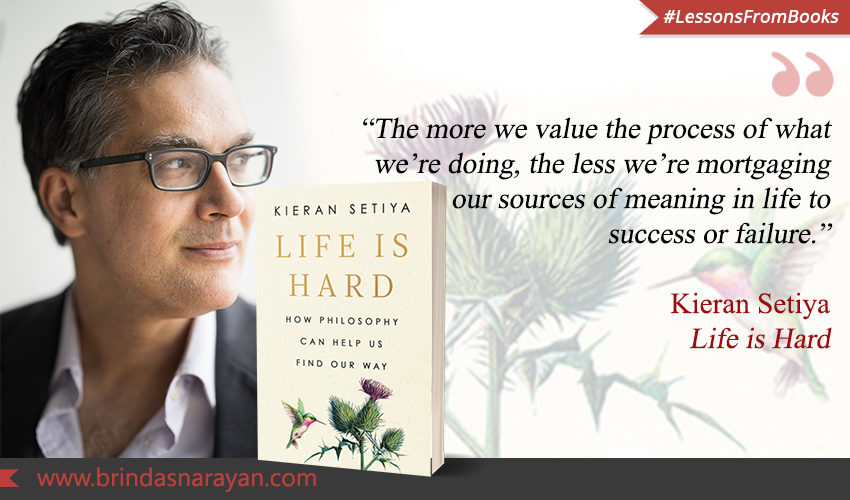
A Philosopher’s Take on Riding Through Life’s Roughs
Kieran Setiya: Reaches Out to a Parched Public
There was a time when philosophers used to tell us how to live. How to deal with hardships, circumvent obstacles, conquer grief and usher joy. Unfortunately, in recent times, that’s no longer the case. Most philosophers seem severed from the self-help movement, so much so that we laypersons might conceive of them as hatted wizards (or witches) who mutter to themselves inside a Hogwarts-type setting. And whose arcane spells are imparted only to a chosen few, while the rest of us make do with reprints of “How To Win Friends and Influence People” or “The Power of Positive Thinking.”
Fortunately for us, Kieran Setiya, who teaches Philosophy at MIT, seems acutely aware of the gap between the academics and the general public. And who acknowledges that philosophers too, like other authors and thinkers, ought to widen their reach. After all, why plough through the maze – of clever ideas, abstract notions and obscure classics if you can’t use your hard-won findings to impact others?
Acknowledge Your Difficulties
One of the first steps to overcoming hardship is, according to Setiya, a recognition of its existence. He does not recommend brushing aside the circumstances that might be fueling anxiety or causing grief. As a child, Kieran himself had a rather bleak outlook on life. A view that was similar to that of the philosopher Arthur Schopenhauer who wrote: “In early youth, as we contemplate our coming life, we are like children in a theatre before the curtain is raised, sitting there in high spirits and eagerly waiting for the play to begin. It is a blessing that we do not know what is really going to happen.”
As Setiya suggests, “just acknowledging that things are difficult, is absolutely essential.”
Silver Linings In Suffering
He identifies seven sources of suffering: Infirmity, Loneliness, Grief, Failure, Injustice, Absurdity, Hope. He suggests that we stop pursuing “happiness” and start looking at the silver linings in various afflictions. For instance, failure can help us empathize with others who have failed. Injustice can imbue us with purpose, and loneliness might compel us to value other people.
Don’t Strive For Impossible Ideals
Of course, happiness can work as a goal for some; it’s just not a universal prerequisite for a good life. He also warns against striving too hard for some unattainable ideal, whether that’s happiness or justice or beauty or compassion. After all, we’re all fallible creatures with limits. Why not settle for much less, since as Setiya puts it, “The best is often out of reach.”
Rethink Failure and Success
Also taking a broader view, failure stems from the notion of a life as a linear graph or a ladder that we are expected to constantly scale upward. If we accept that life is squiggly or even shapeless, then failure is merely one of those swamps or puddles we need to step through. There is a point at which we will emerge from the wetness or at least stop caring about the loss.
Grief is Subjective and Personal
We also should not feel guilty about grieving too much or too little – there are no right ways or right degrees of grief. Moreover, we do not have to feel disloyal about not grieving. “The tempering of grief is not betrayal.”
Savor The Process
In general, he suggests that we counter the seeming meaninglessness by relishing small joys – the cup of gingery chai or the stroll through a sun-dappled park. He also seems to imply that we need to strive for social justice or a more equitable distribution of goods to make our existence worthwhile. But Justice need not be every person’s overarching goal – for an artist, it can be Beauty. For a teacher, it can be a stimulated student. For a homemaker, it can be as simple as getting the dishes done.
Stop Seeing Life As A Linear Narrative
Kieran also asks us to stop thinking of our own lives as stories or grand narratives, with redemptive endings. After all, such perspectives place too much weight on outcomes rather than on processes. We don’t need to be heroines or heroes who stumble on secret codes or pots of gold. To repeat the oft-quoted message from Steve Jobs, the journey matters more than the destination.
And if you’re not, for the large part, enjoying the process – whether that’s teaching kindergartners, or writing a novel, or running an enterprise – then maybe you should consider doing something else.
“The more we value the process of what we’re doing, the less we’re mortgaging our sources of meaning in life to success or failure. I think in both of these ways, resisting linear narrative and resisting the project-driven framing of life, we can push back against how we think about our lives.”
Even Philosophers Face Troubles
Setiya, while being a Professor of Philosophy at MIT also admits to his own humanity and frailties. For instance, he suffers from a very painful chronic illness. Moreover, he watches his mother slip into Alzheimer’s. He writes lyrically of the hopes he continues to harbor: “I can hope to see my mother again, to hold her hand and walk with her along the foreshore where the estuary gathers the tides and the great bridge sweeps across the river mouth, curving with the earth.”
Despite being written by a Philosophy Professor, it’s a friendly book. It’s like chatting with an intensely intelligent and well-read uncle, who has waded through situations well enough to dispense many wise afterthoughts.
References
Kieran Setiya, Life is Hard: How Philosophy Can Help Us Find Our Way, Penguin, 2022




